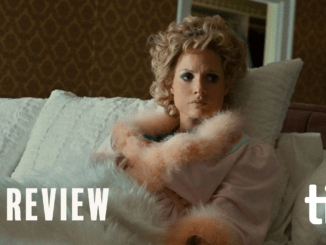Over the 100 plus year history of film, it’s hard to imagine a better director than Alfred Hitchcock. Throughout his illustrious career, Hitch directed masterpiece after masterpiece, which has led many too often imitate but never duplicates Hitchcock’s mastery of the craft. Despite his work’s brilliance, Hitch never won an Academy Award; however, one of his films did receive the honor of Best Picture. Eighty years later, director Ben Wheatley brings Hitchcock’s masterpiece Rebecca back to the screen. However, rather than imitate Hitchcock’s work as other directors have done with remakes in the past, Wheatley crafts a spellbinding film that evokes an ambiance and eeriness that makes Rebecca a pleasant surprise.
“Last night, I dreamt of Manderley again” opens the film based on the 1938 novel of the same name written by Daphne Du Maurier and a remake of the 1940 Hitchcock film. Rebecca follows widower Maxim de Winter (Armie Hammer) and Lily James as the new Mrs. de Winter as they embark on a new exciting relationship while confronting Maxim’s past in the form of his first wife, Rebecca. The latter died before the events of the film. Rebecca is beloved by all and, despite being deceased, remains a constant presence in the lives of not only Mrs. de Winter but the menacing Mrs. Danvers.
Rather than focus on just the romantic aspect of the pair, Ben Wheatley shifts Rebecca’s themes to Mrs. de Winter, keeping her self-identity as she battles the ghost of Maxim’s previous deceased wife, Rebecca. Throughout the film, Rebecca’s presence, while not supernatural, lingers throughout their home, friends, and the ominous Mrs. Danvers. Lily James evokes the desire to please everyone and be accepted while entering a constant battle with herself not to change who she was before she arrived at Manderley.
Jane Goldman’s script also looks at the theme of a female’s insecurities due to societal pressures that come with not just marriage but living up to the expectations set by a previous beloved wife. This blends wonderfully with the concept of self-identity, which makes Mrs. de Winter the most compelling character in the film.
While not on the level of Sir Laurence Olivier’s masterful work in Hitchcock’s masterpiece, Armie Hammer delivers an adequate turn as Mr. de Winter. Hammer’s take oozes his predecessor’s style and bravado while making every man who watches this film wonder where they can find a mustard-colored suit to wear.
Fans of the original adaptation may wonder how Mrs. Danvers is in this iteration. Danvers’ authentic portrayal is the cinematic female monster precursor to such great villains as Norma Desmond and the infamous Nurse Ratched. Judith Anderson’s portrayal as one of the best of the 1940s and Kristen Scott Thomas is up to the task as she is both menacing and cold in this role and makes quite the adversary for Mrs. de Winter.
The film’s cinematography is quite a sight to behold. Laurie Rose beautifully shot it. Rose’s use of light and darkness, especially when we are taken to Manderley, adds to the film’s overall tone. Alfred Hitchcock’s ability to shift the movie’s style from a character study to a crime drama is masterfully executed, and that is where Bean Wheatley and this iteration suffers. Around that shift, the film comes off as two separate entities rather than one concise piece.
As Mrs. de Winter struggles with Rebecca’s looming ghost, Ben Wheatley tackles the lingering spirit of Hitchcock and his Best Picture-winning film in one of the better remakes of the master of suspense’s work. While Rebecca will certainly not remove the sentiment from cinephiles wondering why a new remake was necessary, Wheatley’s take surpasses the quality of the Psycho and Rear Window remakes.






